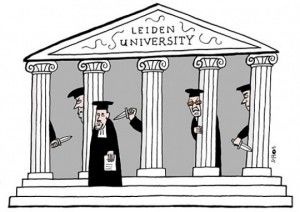Cognition
Use And Abuse Of Backdoor Reference Checks In Universities
Violating the human to protect the resource
Posted August 5, 2019
Imagine applying for your dream job. You submit your CV, letter of motivation, and your list of references. You are then invited to interview, which seems to go well. And all the signs are that you nailed the role. However, it then turns out that your job application is rejected. You are both down and surprised. But then wait. You find out that the hiring manager did some fishing. They phoned around, until they found someone who had once known you, in a previous role. This person then provided a negative reference, perhaps over the phone, or in writing, which was then used by the interviewer to bad mouth you in the interview panel. And that was it. Your job went to someone else.
The phenomenon of contacting people not found on a job applicant’s declared list of referees is called a ‘backdoor’ reference check. It is reportedly widely used by HR consultants and hiring managers in many sectors, in making hiring decisions. And anecdotally, it is widely used in hiring members of academic faculty, in the Higher Education sector, including at universities I’ve worked at.
Just to be clear from the outset, a ‘backdoor’ reference check is not the same thing as looking up a job applicant’s social media profile, for instance, by examining them on LinkedIn. Social media posts that are in the public domain are, by definition, public. A ‘backdoor’ reference check is an altogether different beast. After all, it breaches an applicant’s expectation of, and indeed, right to confidentiality.
Writing on The Planted Blog, HR expert Deb Feldman explains this as follows:
“Anyone who applies…has an expectation that their candidacy will be held in strict confidence. Even if you are asking someone who worked with the candidate at a past-not-current job, and even if that person is someone you trust implicitly–you’re still breaking that trust. It’s not a great place to start the relationship.”
In addition to the issue of confidentiality, a ‘backdoor’ reference check poses a reliability problem for the hiring manager. After all, how can you be sure that the person contacted doesn’t have a hidden agenda, in providing the backdoor reference? Backdoor reference checks are done on the presumption of anonymity—the job candidate doesn’t know that ‘backdoor’ references are being contacted. This, in turn, provides greater freedom to provide negative information, which might be factually inaccurate or arise from a personal grudge. For this reason, responsible HR practitioners raise awareness of common pitfalls of backdoor reference checks and advise against them (especially when conducted without the consent of the applicant). As one leading company in the HR industry notes: “When you’re relying on someone your candidate hasn’t suggested as a reference, you run the risk of being fed inaccurate or incomplete information.”

Violating the human to manage the resource
In university contexts, backdoor reference checks are, according to HR management researcher, Prof. Moon (California State University, East Bay), widespread, yet largely unreported. According to Prof. Moon, the use of backdoor reference checks in the Academy is ironic as it “authorizes concealed methods and suppressed information within an institutional context of scholarship that requires data and methodology transparency and participant consent to be considered ethical and legitimate.”
Moon defines a backdoor (also known as “off list”) reference check according to three criteria:
“1) secretive, undocumented, and unrestricted searches for individuals acquainted with the applicant but not included on the applicant’s submitted list of professional references;
2) possible contact with select off-list sources without clearing them in advance with the applicant and without disclosing to the applicant and others who, if anyone, was contacted; and
3) the prospective employer’s choice to make hiring decisions based on information obtained from off-list sources.”
Moon argues that backdoor reference checks violate the human, in order to manage the resource. But in so doing, they lead to problems of unreliability, as they are shielded from proper scrutiny, leading to problems of confidentiality and ethics.
The Case of Leiden University
While backdoor reference checks are anecdotally particularly common in the Academy, verified cases are hard to ascertain, precisely because they are shrouded in secrecy. This changed with a recent court case, in The Netherlands, involving one of the country’s leading seats of learning: Leiden University. In a lawsuit that I brought, Leiden University was convicted in June 2019 of illegally conducting a backdoor reference check on my application for a Professorship in English Linguistics, in the Linguistic Institute. The official court verdict can be found here. To my knowledge, this remains, to date, the only law case of its kind, resulting in a university convicted for a backdoor reference check.

The facts are as follows. In 2016, I was invited to interview at Leiden University, for a position as Professor of English Linguistics. The week before the interview took place, the Director of the Leiden University Institute for Linguistics conducted backdoor reference checks on me, but not the other candidates for interview. One of those people he contacted, a Professor of Applied Linguistics at a University in Austria (University of Graz), agreed to provide a letter of reference on the condition her identity would not be revealed. This person had previously worked at my institution. The letter was highly defamatory and factually inaccurate.
The Institute Director then gained permission from the Chair of the Selection Committee, the Dean of Faculty, to read the letter out loud during the voting process on candidates. The Dean was told the letter could only be used on condition of anonymity, and he did not enquire as to the credentials nor motivation of the letter’s author. The worst parts of the letter were read out by the Director, who also led the committee to believe the author was based at my employing institution. Needless to say, my application was rejected, despite my candidacy being arguably the strongest.
Under Dutch and EU employment law, soliciting references in this way, without the knowledge or consent of the candidate is illegal. It violates the confidentiality of the candidate. Moreover, it is inherently unfair as the candidate doesn’t have an opportunity to challenge anything critical, for instance, at interview, as the whole process is anonymous and secretive.
A summary of the case has been reported on in the Times Higher Education. My website also provides an overview of the case, including links to Dutch press coverage.
The black art of backstabbing in theoretical disputes
In the case of Leiden University, the use of a backdoor letter of reference appears to have been a deliberate attempt to sabotage my candidacy. It was orchestrated by both the institute's director and the author of the anonymous letter. Leiden University only belatedly released the letter during the course of court proceedings, during which the author’s identity was revealed.

The Institute Director was reportedly motivated by a theoretical objection to a book I have written, The Language Myth. In the academic world, theories are the lifeblood of what drives research and careers. Research funding, rank, status, career progression—one’s very livelihood—are determined by promoting and being part of successful theories. The prevailing theory in linguistics is associated with an MIT researcher named Noam Chomsky. He proposed, in the 1960s, that language is too difficult to learn, with normal cognitive functions. The difference between animals (who don't have language) and humans (who do), is that human infants are born with a “language gene”, he claimed. This means that babies begin acquiring language, at 12 months of age, while baby chimpanzees don't, because humans are born with a language gene. On Chomsky's account, all the world's 7,000 languages share the same essential blueprint for grammar. Human babies can acquire any language, relatively quickly, according to Chomsky, because they are born with innate knowledge about how grammar works. Language learning then simply involves mapping the words and sounds of any single language (e.g., English vs. Dutch vs. Japanese) onto the same underlying grammatical structure--knowledge of which we are all born with.
In 2014, I wrote what has become a very famous book in the linguistics world, entitled: The Language Myth. The book, a pop-sci paperback, became an academic best-seller. Written for a popular audience, it debunks what the book terms the 'myth' peddled by Chomsky and his followers. The book was well-received by many, (see the review in New Scientist and Studies in Language). But those whose careers, research funding and legacy are dependent on being associated with Chomsky's 'language myth', despised the book, which threatened to overturn what they took to be theoretical linguistic orthodoxy. The Leiden University Centre for Linguistics has a significant cohort of Chomskyan adherents. And anecdotally, it appears this was the motivation for the institute director to consciously seek a deliberately negative backdoor reference on me.
An Orwellian surveillance-focused metaphor
One of the reasons, presumably, that backdoor reference checks have currency in the Academy, as Moon puts it in his paper, is that “each of us has nothing to worry about if we have nothing to hide.” But as he observes, this amounts to an Orwellian surveillance-focused metaphor. And “in practice, the nothing-to-hide argument is flawed because it assumes that only troublemakers are implicated.”
In the case of Leiden University, I was caught between a rock and a hard place. A backdoor referee was contacted precisely because this referee held a grudge, and could be relied upon to provide a defamatory reference check. And the Institute Director was singling my candidacy out for backdoor checking, in order to expressly eliminate my candidacy, in order to avoid the risk that I would be appointed. There was no disclosure as to the nature of the backdoor referee’s credentials nor motivation, and none was provided by the Institute Director to the Chair of the Selection Committee. Moreover, without checking the motivation of the Institute Director, the Chair of the Selection Committee, a highly experienced Dean, who should have known better, allowed the anonymous backdoor letter to be read out in the selection committee.
As reported, recently in the Times Higher Education, Leiden University claims that the Institute Director was only motivated, in his actions by attempting to find a “suitable candidate.” This invokes the Orwellian-Surveillance metaphor, as a justification for protecting the resource: the institution, and thereby using a backdoor reference check. After all, according to the metaphor, those that have nothing to hide have nothing to fear. But by virtue of being a secretive process, backdoor reference checks are open to abuse. In the case of Leiden University, the Institute Director failed to disclose the credentials and motivation of the referee (who provided the letter on condition of anonymity). Moreover, he failed to disclose his own motivations, in deliberately soliciting a backdoor reference that he knew would be negative.
As Moon observes: “ that administrators secretly gather and interpret information about a job applicant without allowing discussion about how it is used is an incursion on faculty privacy and rights concerning faculty status and shared governance.”. This is of deep concern for the Academy. But it is also something that should be of wider concern to all HR Management professionals and hiring managers.
References
Moon, M. Y. (2018). Undisclosed off-list reference checks: Violating the human to manage the resource. Ephemera: Theory and Politics in Organization, 18/2: 341-361.




